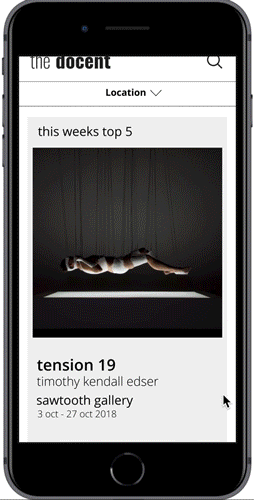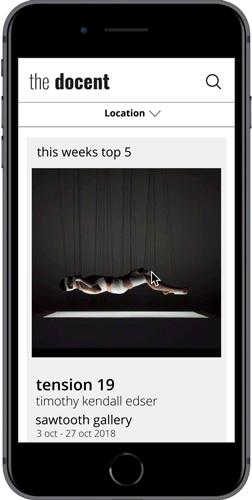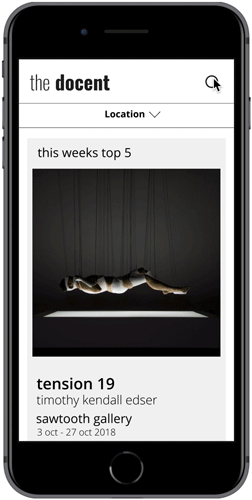The Docent
Personal Project
Having been a practising artist for more than 15 years I have always found joy and inspiration when visiting galleries to see what other artists are exhibiting. However, in a city like Melbourne, with its vibrant arts scene, it is easy to lose touch with the latest exhibitions and events.
Keeping up to date with the latest exhibitions becomes a mundane and time-consuming task of searching websites, while gallery email newsletters clog up your inbox.
During the Melbourne Art Fair, a close friend who is a well know art curator commented to me, “It is so hard to find what events are on in Melbourne, there is no easy art guide that I can look at.” He also commented that unlike other Australian cities where galleries can be found in either a main cultural precinct or clustered in one or two suburbs, Melbourne’s galleries were spread right across the city.
This is how the docent was born.
What is the docent?
A docent is a name typically given to a person who acts as a guide in a museum or art gallery. It also became the name for an app I developed which helps art lovers find and locate art exhibitions and events in Melbourne.
Aim: To assist people to find out more about what events are happening in the Melbourne art scene.
Duration: 2 weeks

Research
Competitor analysis
How are people finding out about current exhibitions?
I started my project by conducting a competitive analysis of other services that assist users in finding their way into the local art scene.
Social Media
Strengths
- Up to date information
- View large format images and description of exhibitions
Weaknesses
- Need to be already aware of the gallery space
- Need to view a secondary site to find out more information
- No suggestions for further exploration
Gallery Information
- Website
- Email list
Strengths
- Reminds you of events coming up
- Up to date information
- Large amounts of information about the exhibition and artist biography
Weaknesses
- Emails fill up inbox
- Awareness of gallery spaces prior
- Lack of information about other gallery spaces
Art Publications
- Art Almanac
- Art Guide
Strengths
- Allows for searching particular suburbs
- Strong image presence for paid listings
Weaknesses
- Limits content to galleries that pay for publication
- More information in the printed version of the publication
- Lack of detail about the exhibition and artist
Local Government
- What's on Melbourne
Strengths
- Up to date listings of all gallery spaces
- Information about the exhibition and artists
Weaknesses
- Listings are constrained by the limits of the Melbourne City Council
- Information fragmented between gallery details and event details
Research
User Interviews
A series of interviews with both art enthusiasts and gallerists explored the following:
- Experiences of searching for events
- Information that is needed to visit a gallery
- Their decision making process to visit a particular gallery
- Process taken to inform the public about an exhibition
In doing so I was able to perform a contextual enquiry within different settings to better understand the users goals and frustrations.

Defining the research
Key insights
Key insights and trends quickly emerged from user research including:
- Accessibility of information in one place
- When visiting a gallery the user is more likely to visit more than one in the same area
- Users plan visits when on holidays or when visiting large cultural institutions
- Most likely to use a mobile device to search
- Users indicated they often were not sure where to start searching for information
- Had to search multiple sites to find information
- Users found it difficult to locate up-to-date information
- Users often decided to visit a gallery based on the image and description of the exhibition
Development
Problem Statment
How might we provide our users with more information about what is on right now in Melbourne’s art scene?
Solution Statment
Giving our users up-to-date exhibition details with images, open times with locations, and ways to explore Melbourne’s art precincts will help our users navigate and discover Melbourne’s vibrant art community.
Development
Prototyping and design iterations
During the prototyping stage it was important to be able to start by using a series of paper prototypes. This process enabled me to ensure all the features the user required were included and a minimal viable product. Through this process I was also able to edit the content design of the project and allow for any edits to the user flow.
The design process of the docent went through multiple iterations. As the project is aimed at people who prioritise visuals it was really important to consider the user interface.
On the left are examples of the wire framing that was completed and on the right side are several design styles.

Key design features
Suburb search function
Large format images are fundamental to the design
Clear information on exhibition, artist, gallery, and open dates

Small description of exhibition
Infomation on opening times
Map to assist in locating venue
Disability access information
Deliverable
Hi-Fidelity Prototype

Landing page the docent
The landing page for the docent brings the user to an overview of current events.
The suggestion of 5 events allows the user to have a snapshot of what is happening, and a starting point to discover more events.
The use of prominent imagery reflected user research stating imagery significantly influenced their decision to attend an event or exhibition.

Exhibition page
A short description of the exhibition is featured below the image to assist the user in their decision making process.
Other important information such as open times, gallery details and access to the venue is available below the description.
The location button at the top the exhibition details allows the user to search what other exhibitions are also on nearby.

Location search
A search function in the top right corner allows the user to search by artist name or gallery if know.
The user also has the ability to find galleries that are in a particular location and is able to select either a single area or multiple areas at the same time.
Once a location is selected, the user has the ability to sort the listings.
Click here to have a go at the clickable prototype yourself